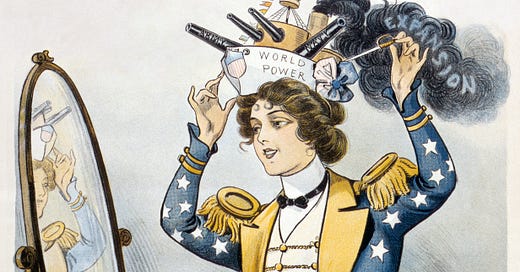This is the second of three posts relating to the historic evolution of our founders’ notion of the United States as an exemplary nation, a beacon illuminating the possibilities of freedom. The first focuses on our founding as the original post-colonial nation, through the statecraft and vision of John Quincy Adams. This post, the second, focuses on the nineteenth century, when our ideals as the first post-colonial nation would run into the realities of our continental expansion. The third considers the early-twentieth-century rivalry of Theodore Roosevelt and Woodrow Wilson, advocating alternative visions of the United States as a global power that persist into the twenty-first century.
A Continental Nation Seeks New Frontiers
America cannot have an empire abroad and a republic at home. — Mark Twain
For most of the nineteenth century, the United States set about nation building at home. Territorial expansion and consolidation is a zero-sum process. Sustained force and hard-edged diplomacy overcame the competing claims of European and neighboring powers, the rebelling Southern states in our Civil War, and Indian nations. As with the establishment of other nations, it was at times marked by ruthlessness at odds with our self-conception.
Our frontier moved inexorably westward. The Census Bureau officially declared the frontier closed in 1890. The United States now reached from sea-to-sea, Atlantic to Pacific. In a melancholy coda, the wars against Indian tribes concluded with the Battle of Wounded Knee, later recalled as the Wounded Knee Massacre, on December 29, 1890.
The closing of the frontier was recognized at the time as a hinge moment in history. Woodrow Wilson, speaking as president of Princeton University in 1901, pointed the nation toward “new frontiers.”
Keep reading with a 7-day free trial
Subscribe to The New Nationalist to keep reading this post and get 7 days of free access to the full post archives.





